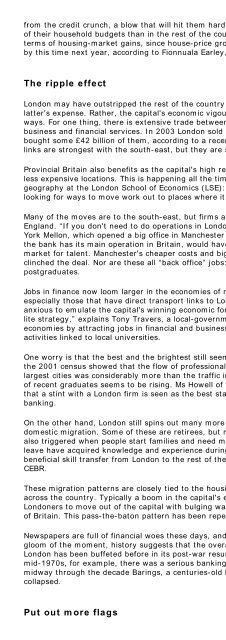The Economist December 1st 2007 - Online Public Access Catalog
The Economist December 1st 2007 - Online Public Access Catalog
The Economist December 1st 2007 - Online Public Access Catalog
- No tags were found...
Create successful ePaper yourself
Turn your PDF publications into a flip-book with our unique Google optimized e-Paper software.
from the credit crunch, a blow that will hit them hard since housing costs already gobble up a bigger shareof their household budgets than in the rest of the country. And they can expect no consolation prize interms of housing-market gains, since house-price growth will slow to zero both nationally and in the southby this time next year, according to Fionnuala Earley, an economist at the Nationwide Building Society.<strong>The</strong> ripple effectLondon may have outstripped the rest of the country in the past decade but this has not been at thelatter's expense. Rather, the capital's economic vigour has boosted growth elsewhere in a number ofways. For one thing, there is extensive trade between London and the regions. About half of it is inbusiness and financial services. In 2003 London sold £66 billion of such services to the regions but alsobought some £42 billion of them, according to a recent report by the Centre for Cities, a think-tank. Tradelinks are strongest with the south-east, but they are significant with other regions especially the Midlands.Provincial Britain also benefits as the capital's high rents and labour costs push routine activities out intoless expensive locations. This is happening all the time, points out Ian Gordon, professor of humangeography at the London School of Economics (LSE): “Given London's high costs, firms are constantlylooking for ways to move work out to places where it can be done more cheaply.”Many of the moves are to the south-east, but firms also move farther afield such as to the north-west ofEngland. “If you don't need to do operations in London, why would you?” asks Ivan Royle of Bank of NewYork Mellon, which opened a big office in Manchester two years ago. Expanding in Canary Wharf, wherethe bank has its main operation in Britain, would have meant higher rents, pricier services and a tightermarket for talent. Manchester's cheaper costs and big pool of graduates (its university is Britain's largest)clinched the deal. Nor are these all “back office” jobs: the bank's 750-strong Manchester staff includespostgraduates.Jobs in finance now loom larger in the economies of nearly all big towns than they did a decade ago,especially those that have direct transport links to London. <strong>The</strong> shift is devoutly sought by local leadersanxious to emulate the capital's winning economic formula. “Regional city bosses have adopted a Londonlitestrategy,” explains Tony Travers, a local-government guru at the LSE. <strong>The</strong>y, too, want to fire up theireconomies by attracting jobs in financial and business services and by encouraging knowledge-intensiveactivities linked to local universities.One worry is that the best and the brightest still seem to be lured to the capital. A recent study based onthe 2001 census showed that the flow of professionals and managers to London from Britain's 26 nextlargest cities was considerably more than the traffic in the opposite direction. Indeed, the capital's shareof recent graduates seems to be rising. Ms Howell of the Thames Valley Chamber of Commerce explainsthat a stint with a London firm is seen as the best start to a career in many occupations such as law andbanking.On the other hand, London still spins out many more people to the rest of the country than it attracts indomestic migration. Some of these are retirees, but moves, often to the countryside rather than cities, arealso triggered when people start families and need more space and better public services. Those wholeave have acquired knowledge and experience during their stay in the capital, which “creates a hugelybeneficial skill transfer from London to the rest of the country,” says Douglas McWilliams, the head ofCEBR.<strong>The</strong>se migration patterns are closely tied to the housing market, which also helps to spread prosperityacross the country. Typically a boom in the capital's economy pushes up local house prices. This promptsLondoners to move out of the capital with bulging wallets, which in turn pushes up house prices in the restof Britain. This pass-the-baton pattern has been repeated over the past decade.Newspapers are full of financial woes these days, and there are doubtless more to come. But despite thegloom of the moment, history suggests that the overall economy and the City will both bounce back.London has been buffeted before in its post-war resurgence as an international financial centre. In themid-1970s, for example, there was a serious banking crisis. In the early 1990s banks made big losses andmidway through the decade Barings, a centuries-old bank once dubbed the sixth great power of Europe,collapsed.Put out more flags
















